PROJ6000 - Project Management Processes, Methodologies & Areas
VerifiedAdded on 2022/08/25
|9
|516
|12
Presentation
AI Summary
This presentation delves into the core principles of effective project management, encompassing project management processes, methodologies, and knowledge areas. It explores critical success factors such as stakeholder involvement, executive support, clear requirement specifications, effective planning, and realistic deliverables. The presentation also examines common project management failure factors, including lack of planning and resources, disengaged stakeholders, improper tool selection, and inadequate IT management. The content aligns with the Project Management Body of Knowledge (PMBOK) and emphasizes the importance of applying appropriate tools and techniques, particularly in risk management. This presentation is designed to provide a comprehensive understanding of project management, enabling students to grasp the complexities of project lifecycles and the factors that contribute to project success or failure. The presentation also includes a list of references.
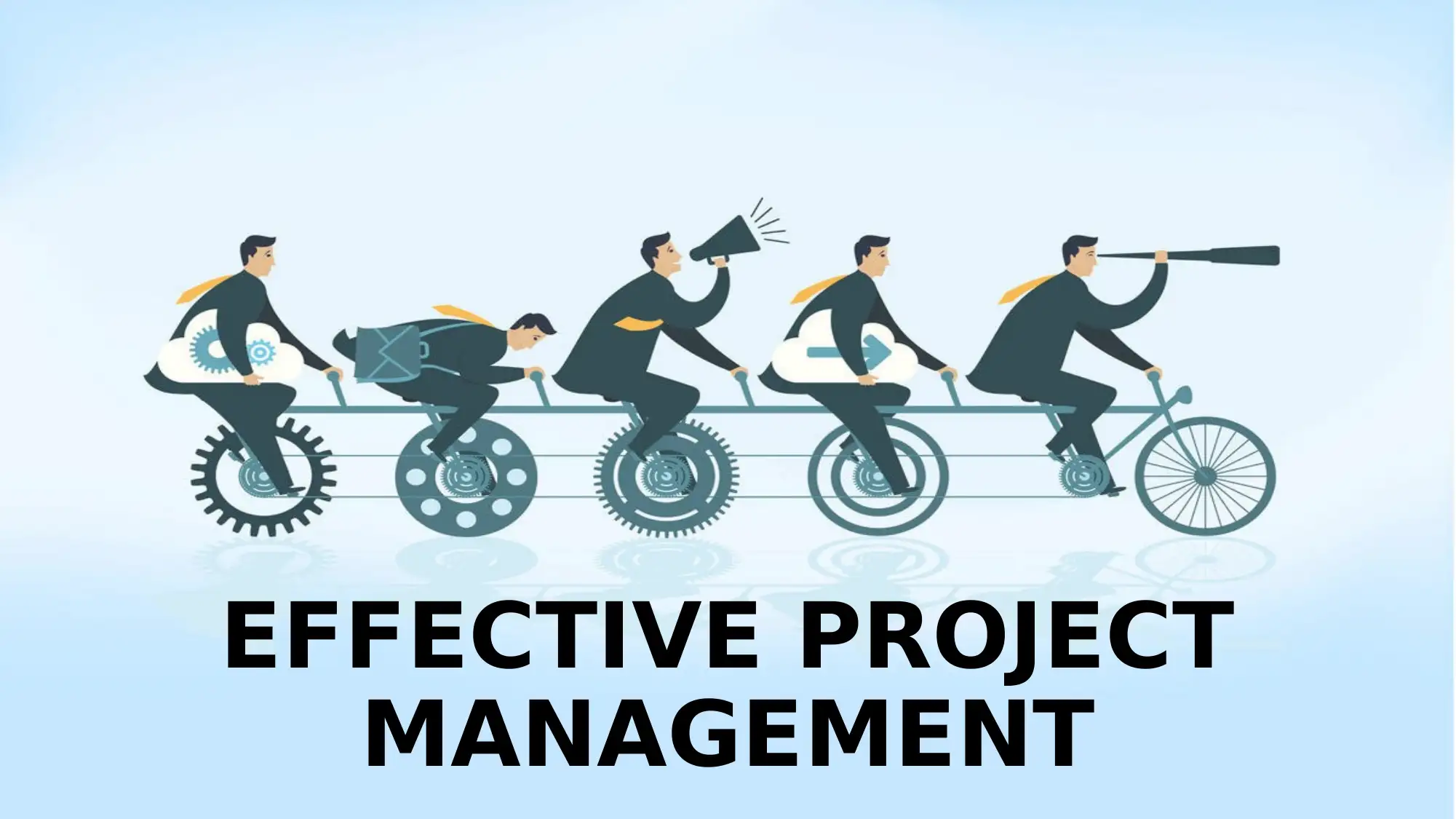
EFFECTIVE PROJECT
MANAGEMENT
MANAGEMENT
Paraphrase This Document
Need a fresh take? Get an instant paraphrase of this document with our AI Paraphraser
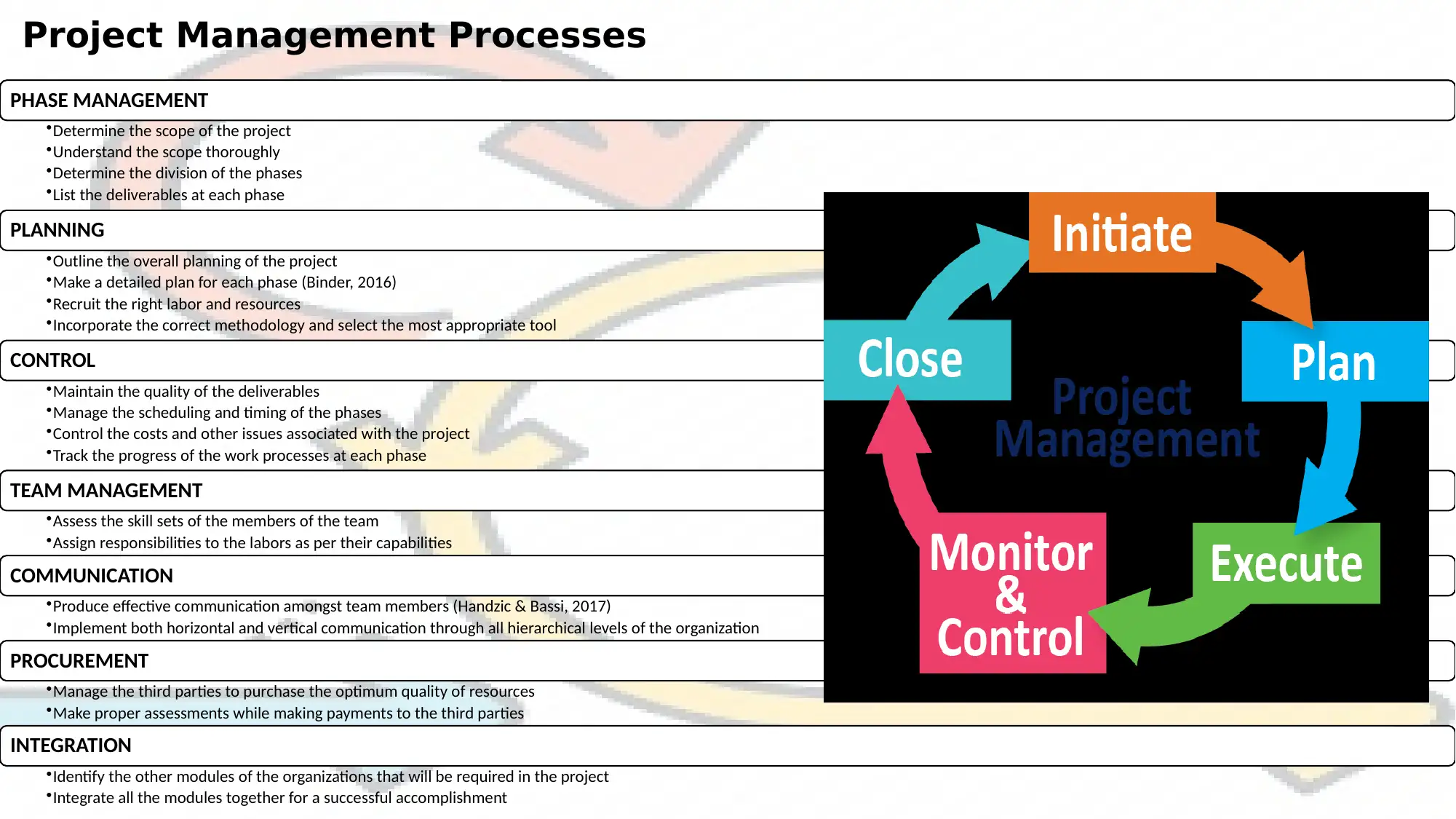
Project Management Processes
PHASE MANAGEMENT
•Determine the scope of the project
•Understand the scope thoroughly
•Determine the division of the phases
•List the deliverables at each phase
PLANNING
•Outline the overall planning of the project
•Make a detailed plan for each phase (Binder, 2016)
•Recruit the right labor and resources
•Incorporate the correct methodology and select the most appropriate tool
CONTROL
•Maintain the quality of the deliverables
•Manage the scheduling and timing of the phases
•Control the costs and other issues associated with the project
•Track the progress of the work processes at each phase
TEAM MANAGEMENT
•Assess the skill sets of the members of the team
•Assign responsibilities to the labors as per their capabilities
COMMUNICATION
•Produce effective communication amongst team members (Handzic & Bassi, 2017)
•Implement both horizontal and vertical communication through all hierarchical levels of the organization
PROCUREMENT
•Manage the third parties to purchase the optimum quality of resources
•Make proper assessments while making payments to the third parties
INTEGRATION
•Identify the other modules of the organizations that will be required in the project
•Integrate all the modules together for a successful accomplishment
PHASE MANAGEMENT
•Determine the scope of the project
•Understand the scope thoroughly
•Determine the division of the phases
•List the deliverables at each phase
PLANNING
•Outline the overall planning of the project
•Make a detailed plan for each phase (Binder, 2016)
•Recruit the right labor and resources
•Incorporate the correct methodology and select the most appropriate tool
CONTROL
•Maintain the quality of the deliverables
•Manage the scheduling and timing of the phases
•Control the costs and other issues associated with the project
•Track the progress of the work processes at each phase
TEAM MANAGEMENT
•Assess the skill sets of the members of the team
•Assign responsibilities to the labors as per their capabilities
COMMUNICATION
•Produce effective communication amongst team members (Handzic & Bassi, 2017)
•Implement both horizontal and vertical communication through all hierarchical levels of the organization
PROCUREMENT
•Manage the third parties to purchase the optimum quality of resources
•Make proper assessments while making payments to the third parties
INTEGRATION
•Identify the other modules of the organizations that will be required in the project
•Integrate all the modules together for a successful accomplishment
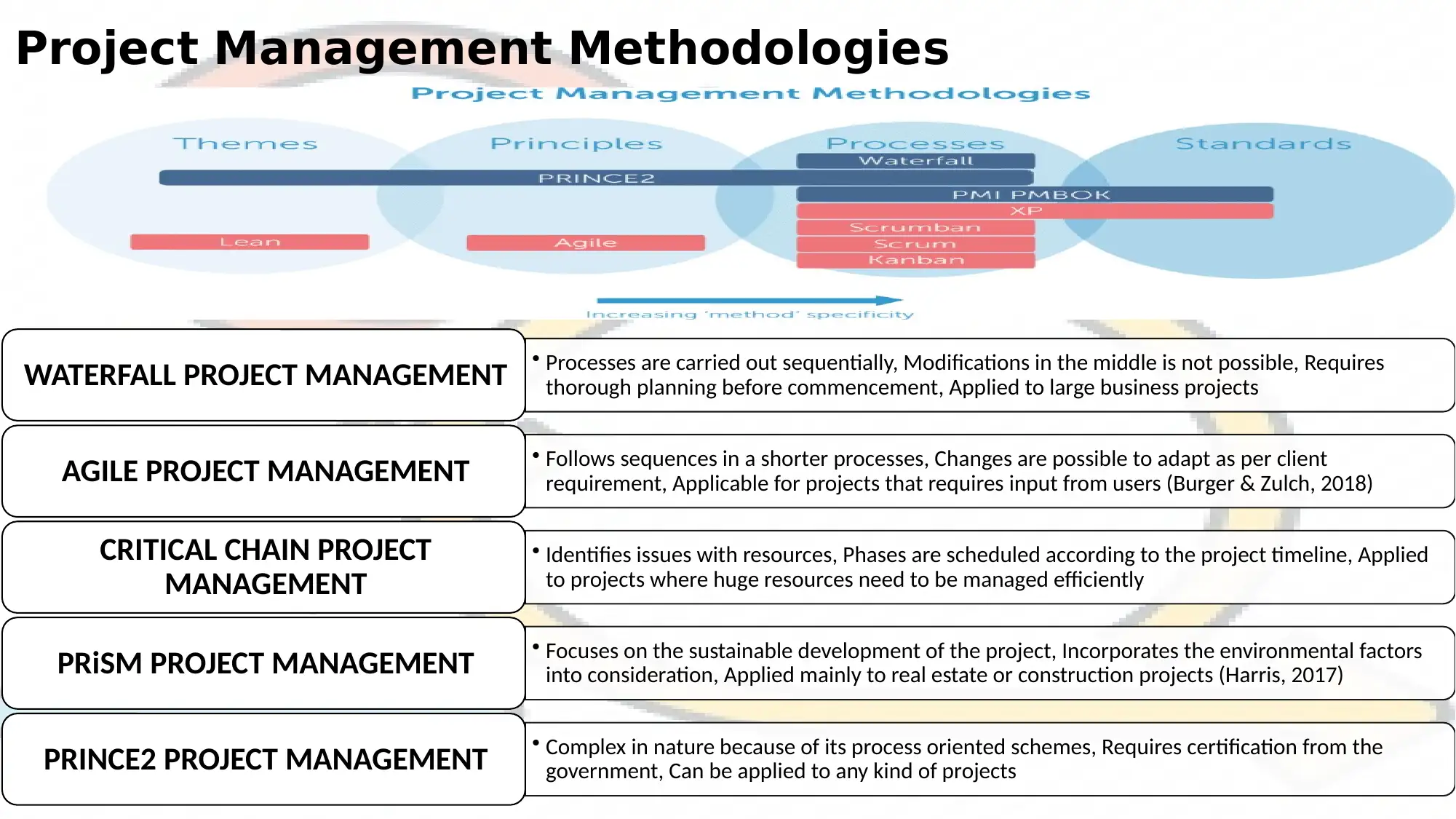
Project Management Methodologies
• Processes are carried out sequentially, Modifications in the middle is not possible, Requires
thorough planning before commencement, Applied to large business projectsWATERFALL PROJECT MANAGEMENT
• Follows sequences in a shorter processes, Changes are possible to adapt as per client
requirement, Applicable for projects that requires input from users (Burger & Zulch, 2018)AGILE PROJECT MANAGEMENT
• Identifies issues with resources, Phases are scheduled according to the project timeline, Applied
to projects where huge resources need to be managed efficiently
CRITICAL CHAIN PROJECT
MANAGEMENT
• Focuses on the sustainable development of the project, Incorporates the environmental factors
into consideration, Applied mainly to real estate or construction projects (Harris, 2017)PRiSM PROJECT MANAGEMENT
• Complex in nature because of its process oriented schemes, Requires certification from the
government, Can be applied to any kind of projectsPRINCE2 PROJECT MANAGEMENT
• Processes are carried out sequentially, Modifications in the middle is not possible, Requires
thorough planning before commencement, Applied to large business projectsWATERFALL PROJECT MANAGEMENT
• Follows sequences in a shorter processes, Changes are possible to adapt as per client
requirement, Applicable for projects that requires input from users (Burger & Zulch, 2018)AGILE PROJECT MANAGEMENT
• Identifies issues with resources, Phases are scheduled according to the project timeline, Applied
to projects where huge resources need to be managed efficiently
CRITICAL CHAIN PROJECT
MANAGEMENT
• Focuses on the sustainable development of the project, Incorporates the environmental factors
into consideration, Applied mainly to real estate or construction projects (Harris, 2017)PRiSM PROJECT MANAGEMENT
• Complex in nature because of its process oriented schemes, Requires certification from the
government, Can be applied to any kind of projectsPRINCE2 PROJECT MANAGEMENT
⊘ This is a preview!⊘
Do you want full access?
Subscribe today to unlock all pages.

Trusted by 1+ million students worldwide
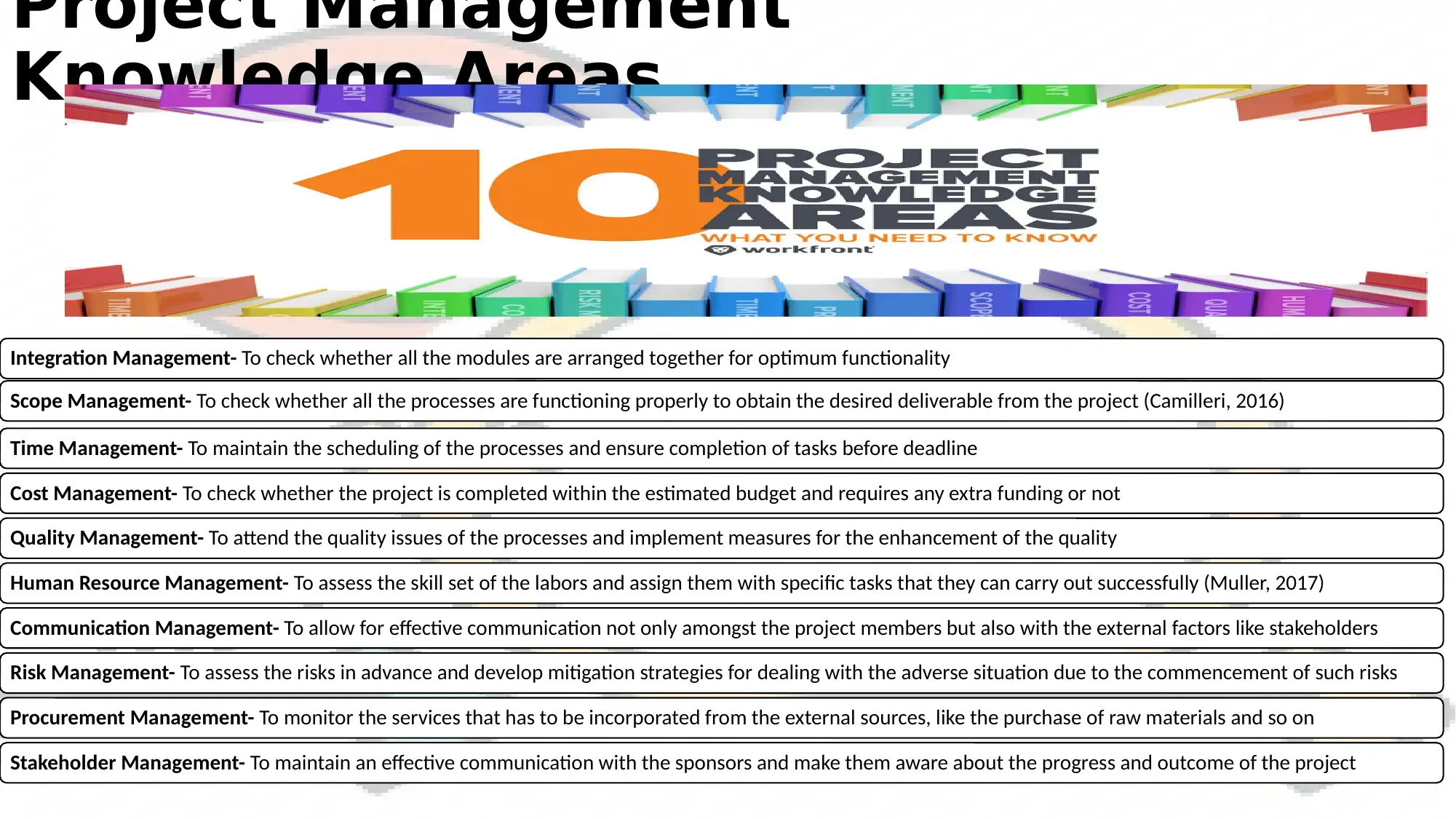
Project Management
Knowledge Areas
Integration Management- To check whether all the modules are arranged together for optimum functionality
Scope Management- To check whether all the processes are functioning properly to obtain the desired deliverable from the project (Camilleri, 2016)
Time Management- To maintain the scheduling of the processes and ensure completion of tasks before deadline
Cost Management- To check whether the project is completed within the estimated budget and requires any extra funding or not
Quality Management- To attend the quality issues of the processes and implement measures for the enhancement of the quality
Human Resource Management- To assess the skill set of the labors and assign them with specific tasks that they can carry out successfully (Muller, 2017)
Communication Management- To allow for effective communication not only amongst the project members but also with the external factors like stakeholders
Risk Management- To assess the risks in advance and develop mitigation strategies for dealing with the adverse situation due to the commencement of such risks
Procurement Management- To monitor the services that has to be incorporated from the external sources, like the purchase of raw materials and so on
Stakeholder Management- To maintain an effective communication with the sponsors and make them aware about the progress and outcome of the project
Knowledge Areas
Integration Management- To check whether all the modules are arranged together for optimum functionality
Scope Management- To check whether all the processes are functioning properly to obtain the desired deliverable from the project (Camilleri, 2016)
Time Management- To maintain the scheduling of the processes and ensure completion of tasks before deadline
Cost Management- To check whether the project is completed within the estimated budget and requires any extra funding or not
Quality Management- To attend the quality issues of the processes and implement measures for the enhancement of the quality
Human Resource Management- To assess the skill set of the labors and assign them with specific tasks that they can carry out successfully (Muller, 2017)
Communication Management- To allow for effective communication not only amongst the project members but also with the external factors like stakeholders
Risk Management- To assess the risks in advance and develop mitigation strategies for dealing with the adverse situation due to the commencement of such risks
Procurement Management- To monitor the services that has to be incorporated from the external sources, like the purchase of raw materials and so on
Stakeholder Management- To maintain an effective communication with the sponsors and make them aware about the progress and outcome of the project
Paraphrase This Document
Need a fresh take? Get an instant paraphrase of this document with our AI Paraphraser
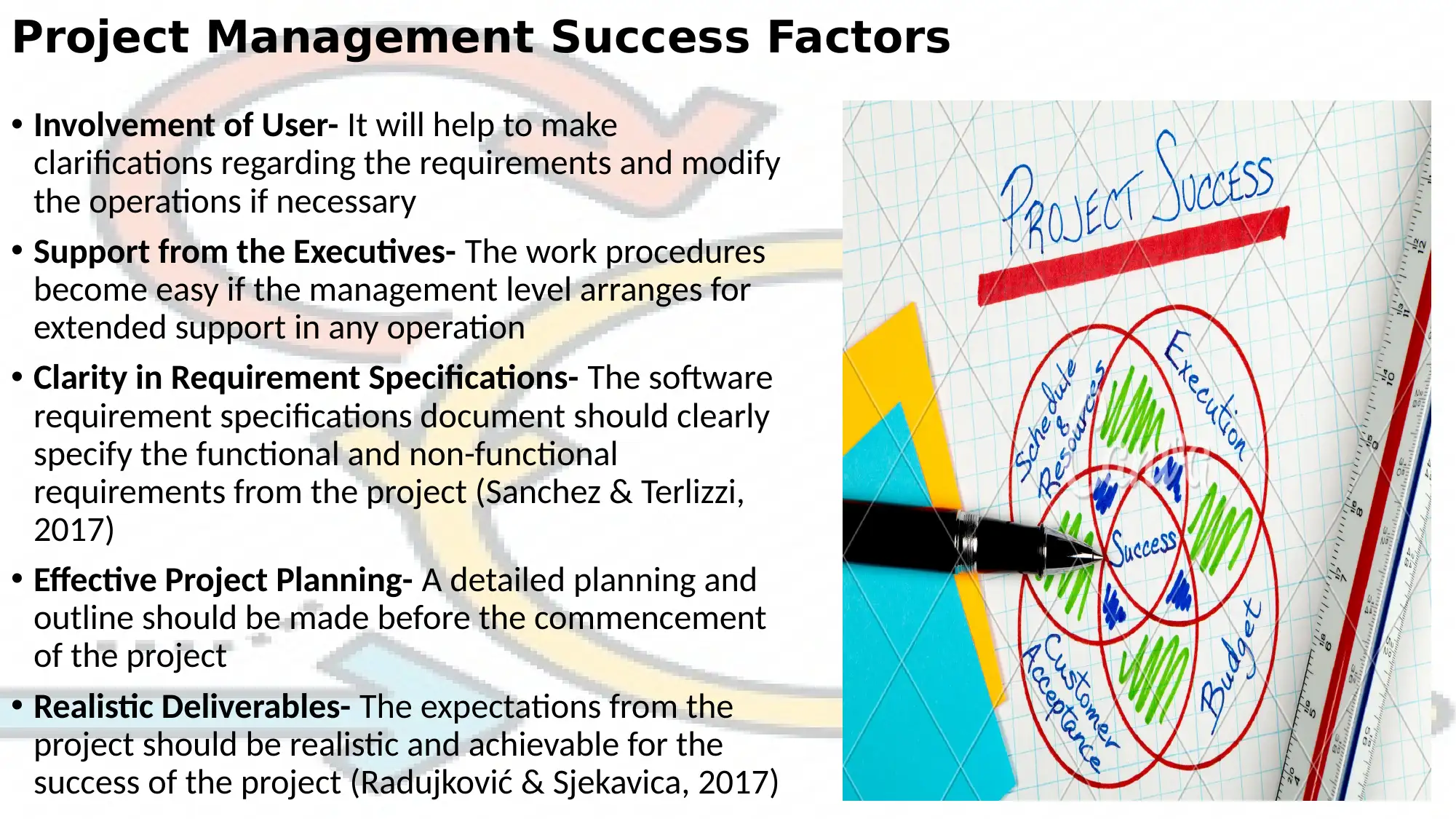
Project Management Success Factors
• Involvement of User- It will help to make
clarifications regarding the requirements and modify
the operations if necessary
• Support from the Executives- The work procedures
become easy if the management level arranges for
extended support in any operation
• Clarity in Requirement Specifications- The software
requirement specifications document should clearly
specify the functional and non-functional
requirements from the project (Sanchez & Terlizzi,
2017)
• Effective Project Planning- A detailed planning and
outline should be made before the commencement
of the project
• Realistic Deliverables- The expectations from the
project should be realistic and achievable for the
success of the project (Radujković & Sjekavica, 2017)
• Involvement of User- It will help to make
clarifications regarding the requirements and modify
the operations if necessary
• Support from the Executives- The work procedures
become easy if the management level arranges for
extended support in any operation
• Clarity in Requirement Specifications- The software
requirement specifications document should clearly
specify the functional and non-functional
requirements from the project (Sanchez & Terlizzi,
2017)
• Effective Project Planning- A detailed planning and
outline should be made before the commencement
of the project
• Realistic Deliverables- The expectations from the
project should be realistic and achievable for the
success of the project (Radujković & Sjekavica, 2017)
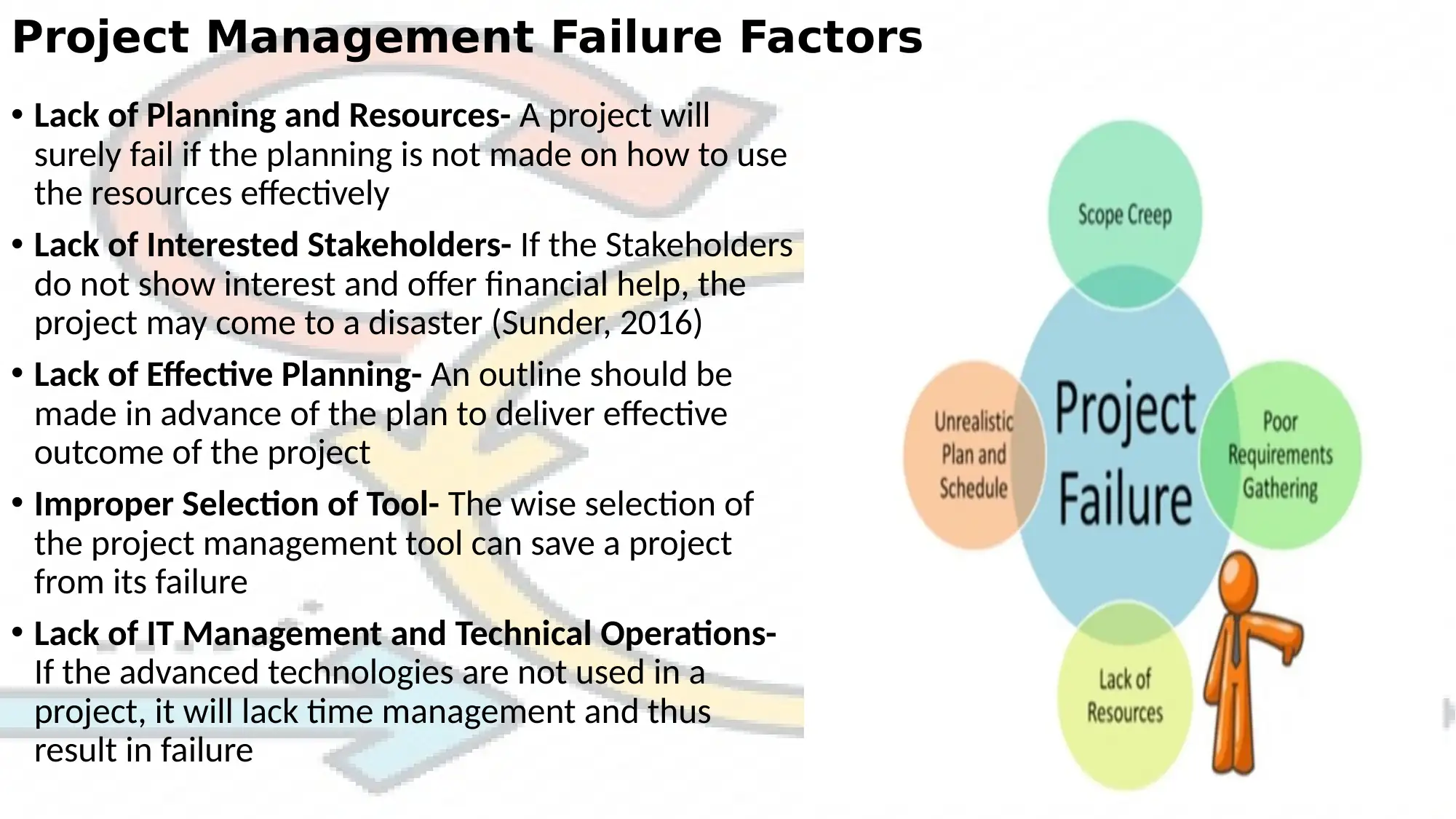
Project Management Failure Factors
• Lack of Planning and Resources- A project will
surely fail if the planning is not made on how to use
the resources effectively
• Lack of Interested Stakeholders- If the Stakeholders
do not show interest and offer financial help, the
project may come to a disaster (Sunder, 2016)
• Lack of Effective Planning- An outline should be
made in advance of the plan to deliver effective
outcome of the project
• Improper Selection of Tool- The wise selection of
the project management tool can save a project
from its failure
• Lack of IT Management and Technical Operations-
If the advanced technologies are not used in a
project, it will lack time management and thus
result in failure
• Lack of Planning and Resources- A project will
surely fail if the planning is not made on how to use
the resources effectively
• Lack of Interested Stakeholders- If the Stakeholders
do not show interest and offer financial help, the
project may come to a disaster (Sunder, 2016)
• Lack of Effective Planning- An outline should be
made in advance of the plan to deliver effective
outcome of the project
• Improper Selection of Tool- The wise selection of
the project management tool can save a project
from its failure
• Lack of IT Management and Technical Operations-
If the advanced technologies are not used in a
project, it will lack time management and thus
result in failure
⊘ This is a preview!⊘
Do you want full access?
Subscribe today to unlock all pages.

Trusted by 1+ million students worldwide
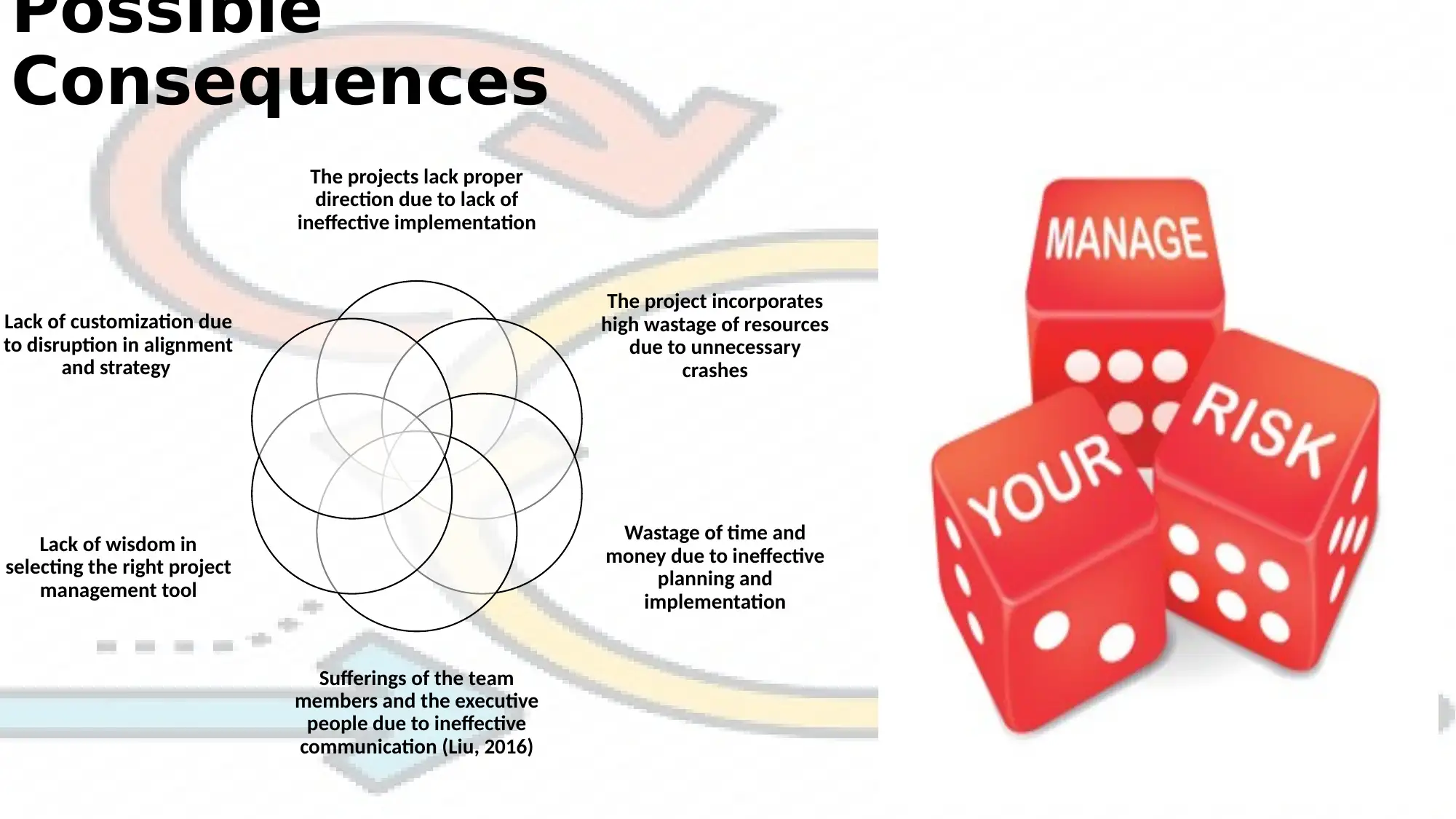
Possible
Consequences
The projects lack proper
direction due to lack of
ineffective implementation
The project incorporates
high wastage of resources
due to unnecessary
crashes
Wastage of time and
money due to ineffective
planning and
implementation
Sufferings of the team
members and the executive
people due to ineffective
communication (Liu, 2016)
Lack of wisdom in
selecting the right project
management tool
Lack of customization due
to disruption in alignment
and strategy
Consequences
The projects lack proper
direction due to lack of
ineffective implementation
The project incorporates
high wastage of resources
due to unnecessary
crashes
Wastage of time and
money due to ineffective
planning and
implementation
Sufferings of the team
members and the executive
people due to ineffective
communication (Liu, 2016)
Lack of wisdom in
selecting the right project
management tool
Lack of customization due
to disruption in alignment
and strategy
Paraphrase This Document
Need a fresh take? Get an instant paraphrase of this document with our AI Paraphraser
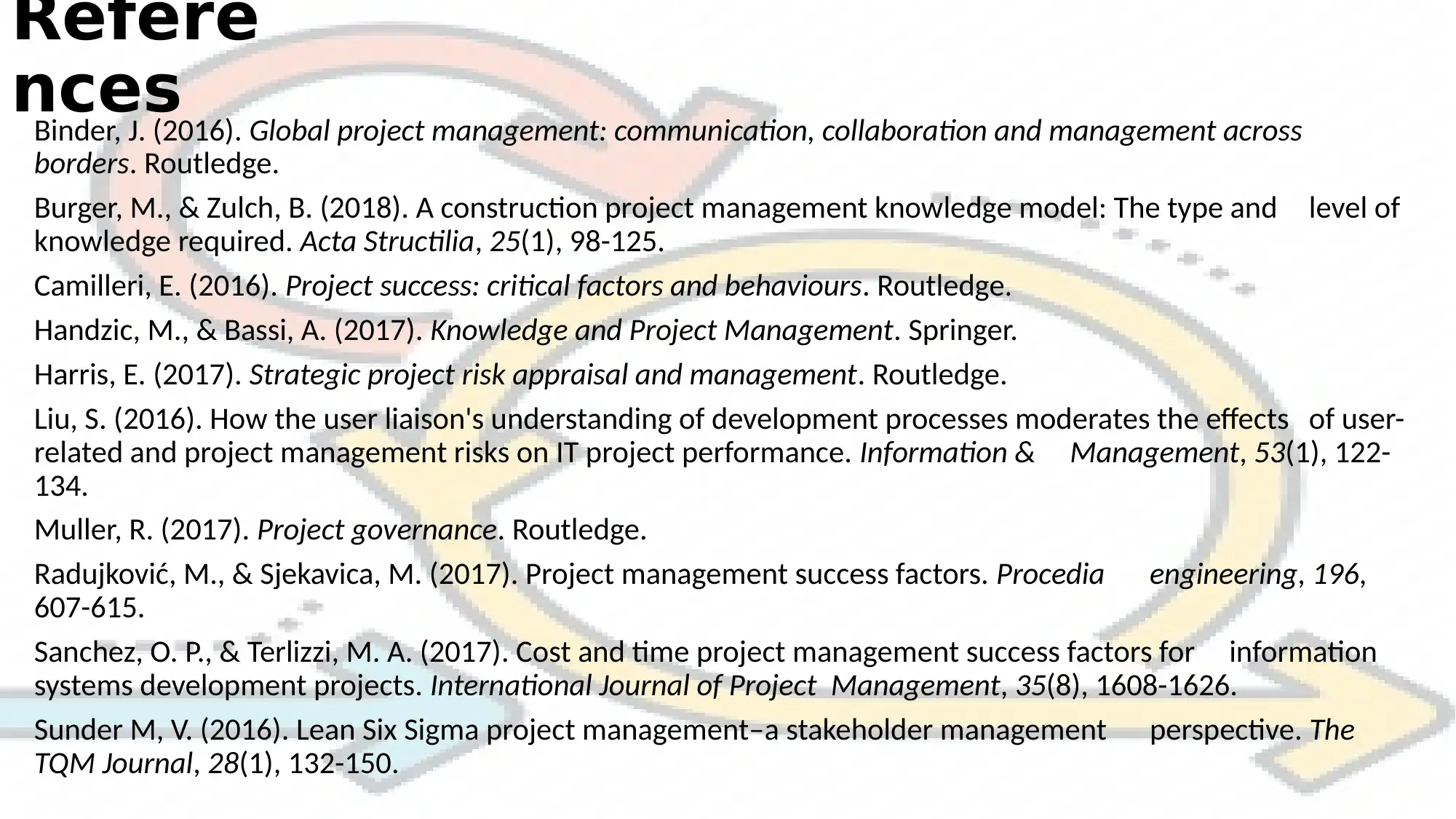
Refere
ncesBinder, J. (2016). Global project management: communication, collaboration and management across
borders. Routledge.
Burger, M., & Zulch, B. (2018). A construction project management knowledge model: The type and level of
knowledge required. Acta Structilia, 25(1), 98-125.
Camilleri, E. (2016). Project success: critical factors and behaviours. Routledge.
Handzic, M., & Bassi, A. (2017). Knowledge and Project Management. Springer.
Harris, E. (2017). Strategic project risk appraisal and management. Routledge.
Liu, S. (2016). How the user liaison's understanding of development processes moderates the effects of user-
related and project management risks on IT project performance. Information & Management, 53(1), 122-
134.
Muller, R. (2017). Project governance. Routledge.
Radujković, M., & Sjekavica, M. (2017). Project management success factors. Procedia engineering, 196,
607-615.
Sanchez, O. P., & Terlizzi, M. A. (2017). Cost and time project management success factors for information
systems development projects. International Journal of Project Management, 35(8), 1608-1626.
Sunder M, V. (2016). Lean Six Sigma project management–a stakeholder management perspective. The
TQM Journal, 28(1), 132-150.
ncesBinder, J. (2016). Global project management: communication, collaboration and management across
borders. Routledge.
Burger, M., & Zulch, B. (2018). A construction project management knowledge model: The type and level of
knowledge required. Acta Structilia, 25(1), 98-125.
Camilleri, E. (2016). Project success: critical factors and behaviours. Routledge.
Handzic, M., & Bassi, A. (2017). Knowledge and Project Management. Springer.
Harris, E. (2017). Strategic project risk appraisal and management. Routledge.
Liu, S. (2016). How the user liaison's understanding of development processes moderates the effects of user-
related and project management risks on IT project performance. Information & Management, 53(1), 122-
134.
Muller, R. (2017). Project governance. Routledge.
Radujković, M., & Sjekavica, M. (2017). Project management success factors. Procedia engineering, 196,
607-615.
Sanchez, O. P., & Terlizzi, M. A. (2017). Cost and time project management success factors for information
systems development projects. International Journal of Project Management, 35(8), 1608-1626.
Sunder M, V. (2016). Lean Six Sigma project management–a stakeholder management perspective. The
TQM Journal, 28(1), 132-150.

⊘ This is a preview!⊘
Do you want full access?
Subscribe today to unlock all pages.

Trusted by 1+ million students worldwide
1 out of 9
Related Documents
Your All-in-One AI-Powered Toolkit for Academic Success.
+13062052269
info@desklib.com
Available 24*7 on WhatsApp / Email
![[object Object]](/_next/static/media/star-bottom.7253800d.svg)
Unlock your academic potential
Copyright © 2020–2026 A2Z Services. All Rights Reserved. Developed and managed by ZUCOL.





